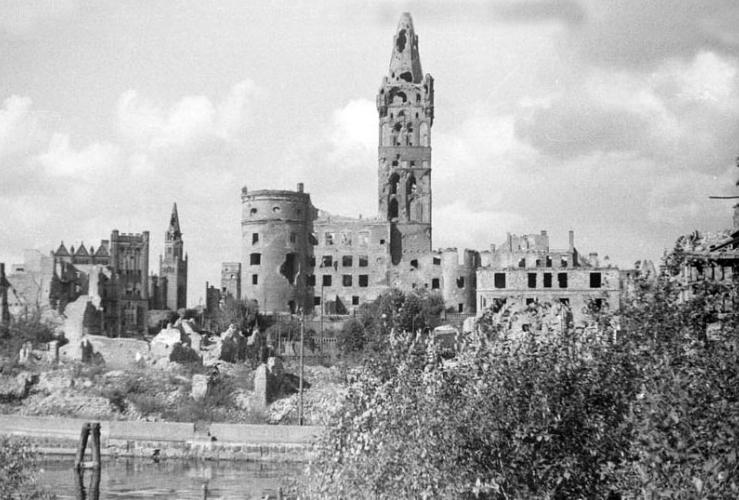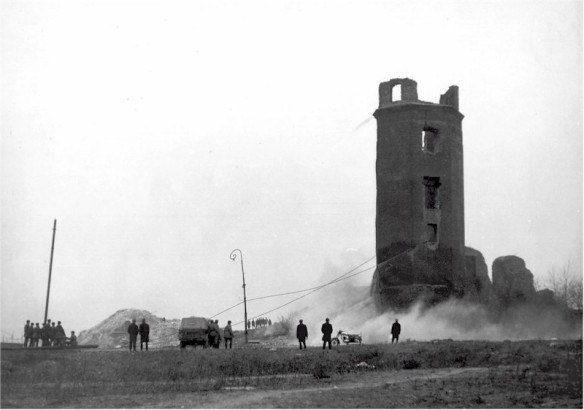Earlier this evening whilst with friends I glanced at the Mail on Sunday, and in particular at Peter Hitchens' column.
Now it is not unknown for him to be criticised these days for having a somewhat pro-Putin stance - well, he is entitled to such views - but here he wrote of NATO jets flying near the "Russian city of Kaliningrad." Surely he meant the occupied German city of Königsberg...
What's in a name you might say .... well rather a lot actually.

Königsberg before the Second World War
Image: The Baltic Review

Königsberg Castle befire the First World War
Image: Wikipedia
The fate of the city in the Second World War is recorded in Bombing of Königsberg in World War II
and in Bombing of Königsberg in World War II - Metapedia and in a book link at The Bombing of Königsberg, August 1944. The fall of the city is set out in Battle of Königsberg, in The Destruction of Königsberg - Königsberg, East Prussia and 11 April 1945: The rape and loot of Konigsberg, capital of Prussia. The comments on these two posts indicate the strong emotions that can still be elicited by thinking about these events. The capture of the city is also set out in Isabel Denny The Fall of Hitler's Fortress City: The Battle for Königsberg.
From photographs as in the links above and in Königsberg, East Prussia - Remembered,which has a series of old photographs and before-and- after pairs of images, it was once an attractive and distinctive Baltic city with a rich heritage.
and in Bombing of Königsberg in World War II - Metapedia and in a book link at The Bombing of Königsberg, August 1944. The fall of the city is set out in Battle of Königsberg, in The Destruction of Königsberg - Königsberg, East Prussia and 11 April 1945: The rape and loot of Konigsberg, capital of Prussia. The comments on these two posts indicate the strong emotions that can still be elicited by thinking about these events. The capture of the city is also set out in Isabel Denny The Fall of Hitler's Fortress City: The Battle for Königsberg.
From photographs as in the links above and in Königsberg, East Prussia - Remembered,which has a series of old photographs and before-and- after pairs of images, it was once an attractive and distinctive Baltic city with a rich heritage.
The conquest of East Prussia an utterly appalling orgy of Soviet murder and rape. The city, together with the northern half of East Prussia was happily conceded by the supine western Allies to the Soviet Union at Potsdam, whilst the southern half of the province was given to Poland as part compensation for the territories seized by the Russians in 1939. The fact that in a plebiscite little more than twenty years earlier only a tiny percentage there had been in favour of uniting with Poland was conveniently ignored and the centuries old, long standing German community forced out - officially this was to be done " orderly and humanely"! By giving Königsberg to the Soviets the other allies implicitly endorsed the takeover of the Baltic States in 1939-40 - an injustice that was not put right until 1991.

The ruins of Königsberg Castle in 1950
Image: europebetweeneastand west
In place of the German city of Königsberg there came the Soviet city of Kaliningrad. The story is set out in From Konigsberg to Kaliningrad: Burying Prussia's past in concrete. Not inconsiderable parts of what had survived - notably the remains of the Castle - were destroyed to obliterate the memory of Prussia.

The destruction of Königsberg Castle
Image: Pinterest

The final destruction of Königsberg Castle in 1968
Image: europebetweeneastand west
After 1991 as a city and territory it was left stranded, and looking for a new role. That has included the rebuilding of the cathedral - which is now Russian Orthodox. Once surrounded by old houses it now sits alone amidst the wasteland created by war, deliberate destruction, communism and modern town planning.
Two recent impressions of the city can be found at Königsberg. The city that withstood destruction - Baltic Worlds and Окраина: The Myth of Königsberg. These do refer to such things as the survival of parts of the old city and something of its spirit. it is now accessible in ways that it was not after 1945, and looks to be a strange and eery mixture of what was and what has been and what is.
Even if some survives much is irretrievably lost - although the reconstruction of Warsaw and more recently in Dresden and Berlin-Potsdam shows what can be achieved. There has indeed been talk of such a project in 2010 for example as Architect seeks to rebuild historic core of Königsberg
The current situation of this detached bit of what is once again Russia ( but never was itself), the Kaliningrad Oblast, is set out in Kaliningrad question.
One suspects its status has become one of those matters politicians like to skirt around - it raises too many awkward questions about the present, let alone the not too distant - and often uncomfortably recent - past. On these points see Baltic Review.com/Eastern Prussia: Freedom to Königsberg
Nor should we forget that what can be said about Königsberg can be said about the whole of East Prussia.
As I said above,what's in a name .... well rather a lot actually.


No comments:
Post a Comment